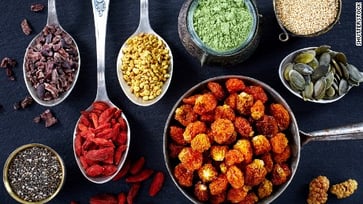
Anti-inflammatory diets are typically not specific regimens but rather eating styles. The Mediterranean diet and the DASH diet are examples of anti-inflammatory diets.
Dietary changes may help manage both short- and long-term inflammation in many cases, although its efficacy as a management tool will depend on a person’s overall health and the causes of inflammation. For example, chronic inflammation can occur due to psoriasis, rheumatoid arthritis, and asthma. While diet changes may help manage some symptoms, it may not be effective in more severe cases.Free radicals are the natural byproducts of some bodily processes, including metabolism. Free radicals can lead to cell damage. This damage increases the risk of inflammation and can contribute to various diseases.
An anti-inflammatory diet favors foods that are rich in antioxidants over those that increase the production of free radicals.
Omega-3 fatty acids, which are present in oily fish, may help reduce the levels of inflammatory proteins in the body. Fiber can also have this effect.
Types of anti-inflammatory diet
Many popular diets already adhere to anti-inflammatory principles. For example, both the Mediterranean diet and the Dietary Approaches to Stop Hypertension (DASH) diet include fresh fruits and vegetables, fish, whole grains, and fats that are good for the heart.
For example, research suggests that the Mediterranean diet, focusing on plant-based foods and healthful oils, can reduce the effects of inflammation on the cardiovascular system.
Learn more about the Mediterranean diet here.
Research also shows that the DASH diet can have a positive impact on reducing inflammation markers compared to regular diets. The DASH diet may also have additional benefits in inflammatory arthritis conditions, such as lowering uric acid levels, which are a risk factor for gout.
Foods to eat
An anti-inflammatory diet should combine a variety of foods that:
- are rich in nutrients
- provide a range of antioxidants
- contain healthful fats
Foods that may help manage inflammation include:
- oily fish, such as tuna and salmon
- fruits, such as blueberries, blackberries, strawberries, and cherries
- vegetables, including kale, spinach, and broccoli
- beans
- nuts and seeds
- olives and olive oil
- fiber
The authors of a 2017 article also recommended the following:
- raw or moderately cooked vegetables
- legumes, such as lentils
- spices, such as ginger and turmeric
- probiotics and prebiotics
- tea
- some herbs
It is worth remembering that no single food will boost a person’s health. It is important to include a variety of healthful ingredients in the diet.

